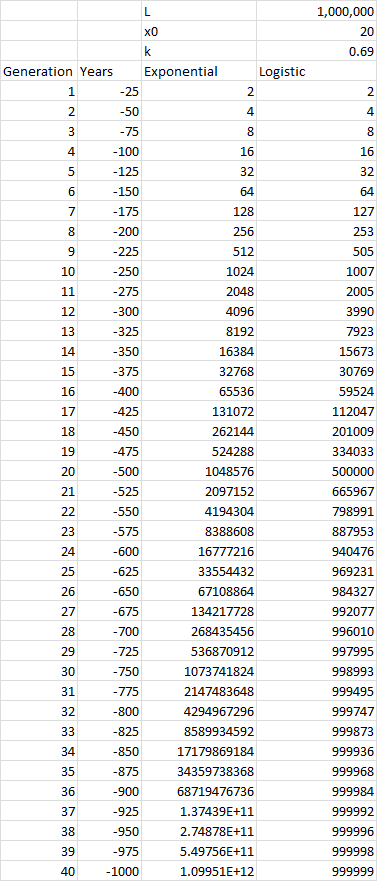“Oh, that happened three generations ago.” We often reckon the passage of time by generations, especially for those indefinite periods measured by a number of successive parent-child relationships.
But just how long is a generation? Don’t we all know as a matter of common knowledge that it generally averages about 25 years from the birth of a parent to the birth of a child, even though it varies case by case? And wasn’t it closer to 20 years in earlier times when humans mated younger and life expectancies were shorter? Where did those numbers come from?
Several recent studies by a sociologist-demographer and groups of population geneticists and biological anthropologists show that male-line generations, from father to son, are always longer on average than female-line generations, from mother to daughter. They show, too, that both are longer than the 25-year interval that conventional wisdom has assigned to a generation. The male generation is at least a third longer, the female generation is longer by perhaps half that amount.
In genealogy, the length of a generation in the past has been used principally as a check on the credibility of evidence — too long a span between parent and child, especially in a maternal line, has been reason to go back and take a more careful look at whether the received information reflects the actual reality, or whether a generation has been omitted or data for two different individuals attributed to the same person. For that purpose, the accepted 25-year average has worked quite acceptably, and birth dates too far out of line with it are properly suspect.
With the growing application of DNA testing to both anthropology and genealogy, the length of a generation takes on far more importance than it had in the past. Many conclusions from DNA evidence in both disciplines are frequently expressed in terms of generations back to a common ancestor, based on the very slow rate at which random changes or mutations take place in DNA patterns over a number of generations.
As an example, let’s look at the Y-DNA that is passed down substantially unchanged from father to son in the male line. We can expect a random mutation to occur at any one of the distinctive markers tested perhaps once in 500 generations. If 25-marker samples are tested from two men descended in all-male lines from the same ancestor, we can expect that one of the 25 markers would have changed for every 20 generational events that separate them (500 generations divided by 25 markers). If the common ancestor was ten generations back from each, so that the two descendants are separated from each other by 20 generations, a single mutation on average might have occurred in either one of the two lines. If the common ancestor was 20 generations back, so that the modern descendants are separated by 40 generational events, we could expect a mutation in each of the lines, and a two-step difference between them. But how many years is that?
At the usually accepted value of four generations per century, ten generations would place the common ancestor only 250 years in the past, in the mid-18th century, suggesting a further search in records of that period for evidence pointing toward the relationship. However, the longer three-generation per century interval indicated by the recent research would place the common ancestor in the late 1600s, with a much reduced chance of finding further documentary evidence bearing on the relationship.
If the common ancestor lived 20 generations back, the 25-year interval would place him about the year 1500, about at the outer limit of genealogically useful records except for kings and nobles. The new higher estimates would place the common ancestor over 700 years in the past, beyond the scope of genealogical research methods.
As early as 1973, archaeologist Kenneth Weiss questioned the accepted 20 and 25-year generational intervals, finding from an analysis of prehistoric burial sites that 27 years was a more appropriate interval, but recognizing that his conclusion could have been affected if community members who died away from the village were buried elsewhere.
When assigning dates to anthropologically common ancestors 50 or more generations in the past, using the “accepted” 20 or 25 years as a conversion factor can produce substantial underestimates of the time interval. Nevertheless, those unsupported values continue in use, even in recent scientific papers.
In the first of the three more recent studies of generation length, sociologist Nancy Howell calculated average generational intervals among present-day members of the !Kung. These are a contemporary hunter-gatherer people of Botswana and Namibia whose life style is probably close to that of all our pre-agricultural ancestors in the dim past. The average age of mothers at birth of their first child was 20 and at the last birth 31, giving a mean of 25.5 years per female generation — considerably above the 20 years often attributed to primitive cultures. Husbands were six to 13 years older, giving a male generational interval of 31 to 38 years.
A second study by population geneticists Marc Tremblay and Hélène Vézina was based on 100 ascending Quebec genealogies from 50 randomly selected couples married between 1899 and 1974. The data came from BALSAC, an inter-university computerized research database at the University of Quebec at Chicoutimi, extracted from Quebec parish baptism and marriage registers going back to the 1600s. With an average depth of nine generations, but extending as far back as 12 or 13 generations, their sample included 10,538 generational intervals. They took as the interval the years between parents’ and children’s marriages, which averaged 31.7 years.
They also determined separate father-son and mother-daughter generational intervals, from lines that included at least five consecutive all-male or all-female generations. These averaged 35.0 years for male generations, 28.7 years for female years.
Biological anthropologist Agnar Helagason and colleagues, in the last of the three studies, used the Icelandic DeCODE genetics database, containing lineages of most Icelanders back two centuries, and much longer for many families. They computed separate patrilineal and matrilineal generation intervals over different lengths of time, to see if that produced a difference. The first values included only lines to ancestors who live in the 1848-1892 time frame, including three to five generations. Then they calculated interval lengths back to ancestors born between 1692 and 1742, extending them to a length of seven to nine generations. The results showed the most recent generations were a little shorter in length than more distant ones — the opposite of what the conventional view holds.
The female line intervals were 28.12 years for the most recent generations, 28.72 years for the whole lineage length. Male-line lineages showed a similar difference, 31.13 years for the recent generations, 31.93 overall. Based on their Icelandic findings and those of the Quebec study, they recommended using a female-line interval of 30 years and a male interval of 35 years.
For the time being, given the imprecision of the various results and my own need for an estimate that lends itself to easy calculation, I am using three generations per century (33 years each) for male lines, 3 1/2 generations per century or seven in two centuries (29 years each) for female lines, when I need to convert generations into years.
As a check on those values, which are based on extensive data and rigorous mathematical analysis, although rounded off for ease of use, I decided to compare the generational intervals from all-male or all-female ranges in my own family lines for the years 1700 to 2000, and was pleasantly surprised to see how closely they agree. For a total of 21 male-line generations among five lines, the average interval was 34 years per generation. For 19 female-line generations from four lines, the average was 29 years per generation.
It’s the nature of the physical and biological sciences that present understandings are always subject to change as more data becomes available and its interpretation becomes more certain — just as genealogical conclusions about relationships are subject to change when better evidence is discovered. Meanwhile, to convert generations to years and probable date ranges, use a value for the generational interval that is soundly based on the best currently available evidence.
Author details
Donn Devine, CGSM, FNGS, is a semi-retired attorney, archivist, and professional consultant on integrating documentary and genetic genealogy.
Acknowledgements
© Copyright 2005 Ancestry.com.
https://isogg.org/wiki/How_long_is_a_generation%3F_Science_provides_an_answer

